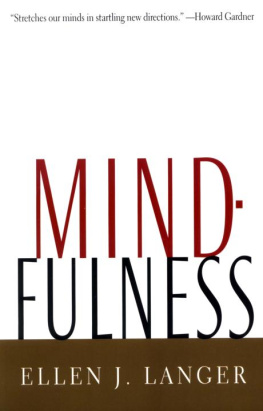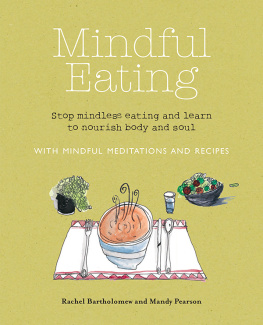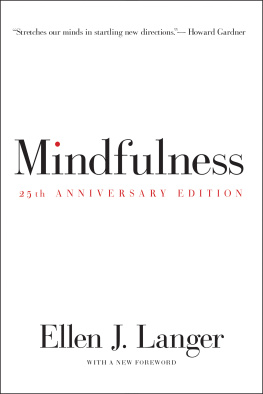`A landmark work of social psychology."
Booklist
"One simply can't finish this book and see the world in the same way."
ALAN DERSHOWITZ
Harvard Law School
"Dr. Langer's seminal work on mindful behavior has broad implications for aviation safety and the development of proper roles for humans vs. machines."
CLAY FOUSHEE
Chief Scientific and Technical Advisor Federal Aviation Authority
"One of the most provocative books that this reviewer has seen in a long time.... Engaging, relevant, and concise, moving smartly from point to point."
Brain/Mind Bulletin
`A truly pioneering study of the dangers and damage of mindlessness and loss of control over one's life; for women and men in age, in corporations and/or in the professions."
BETTY FRIEDAN
"A life-enhancing alternative... the antidote to the rigid, reactive, repetitive patterns that keep the best of us sealed in unlived lives. Langer gives scientific heft to a fascinating and undervalued phenomenon. A thought-provoking read that deserves a wide general audience."
Kirkus Reviews
"Extremely provocative for students. This book cannot be read mindlessly."
ROBERT ABELSON
Yale University
"Fascinating book... has multiple applications for those interested in work, health, creativity, or aging."
Living Room Learning
"Even professional colleagues who have long admired Langer's creative and ground-breaking research will be unprepared for the bold and startling conclusions that derive from her findings."
DARYL BEM
Cornell University
"Ground-breaking research in the field of aging, research that stands to influence the field for years to come."
JOHN W. ROWE, M.D.
President, Mt. Sinai Hospital
"Langer not only challenges us to reach for our untapped reserves, she also shows ways to make this possible."
PAUL BALTES
Max Planck Institute for Human Development and Education, Berlin
"Whether you're an educator, homemaker, business person, mental health worker... differently abled or abled, young or old, there is something in this book for you."
Deaf Community News
"In my seminar on advanced social psychology, Mindfulness stimulated wonderfully lively discussion."
ROGER BROWN
Harvard University
"Langer demonstrates a rare capacity both to see what is extraordinary about human events and to envision even more enlivening human possibilities."
LEE ROSS
Stanford University
"One is reminded, reading these pages, of Freud's Psychopathology of Everyday Life and of Hannah Arendt's The Banality of Evil. Like those pioneering books, this one 'naturalizes' a human scourge-everyday functional stupidity in this case-and makes it not only comprehensible but also subject to change."
JEROME BRUNER,
author of Actual Minds, Possible Worlds
Ellen J. Langer
Mindfulness





To the memory of my mother and grandmother
Contents
PART ONE: Mindlessness
PART TWO: Mindfulness
Acknowledgments
Because I have written and rewritten this book many times, each time trying to make the ideas of interest to a broader audience, and each time enlisting the patient advice of friends and colleagues, I have many people to thank. Robert Abelson, Daryl Bern, Anne Bernays, Otto Brodtrick, Jerome Bruner, Marjorie Garber, Roslyn Garfield, William Goode, John Hallowell, Gerald Holton, Philip Holzman, Barbara Johnson, Jerome Kagan, Aron Katz, Phyllis Katz, Barbara Levine, Beverly London, Letty Cottin Pogrebin, Helen Rees, Eric Rofes, Howard Stevenson, Phyllis Temple, Marjorie Weiner, and Lenore Weitzman have all enriched the book with their perceptive comments. It is an understatement to say that I am grateful for their help. To Elaine Noble I am especially grateful for rich insights on the relationship between mindlessness/mindfulness theory and alcoholism. The technical aspects of preparing this manuscript were carried out with great proficiency by Julie Viens, Barbara Burg, and Andrea Marcus.
Major concepts used in this book are derived from research conducted over the past fifteen years, at Yale, City University of New York, and, for the past twelve years, in the Department of Psychology at Harvard. I am therefore deeply indebted to all the people who collaborated with me on these investigations. Most especially I have profited from years of continued collaboration with Benzion Chanowitz.
My ideas sometimes get the better of me. Before I clearly explain one, another comes to mind and seizes my attention. For this reason, I imagine the reader shares my deep gratitude for Merloyd Lawrence's editorial skills, which have been invaluable in shaping this book.
Mindfiilness
CHAPTER 1
Introduction
I don't like the idea of a unitary subject; I prefer the play of a kaleidoscope: you give it a tap and the little bits of colored glass form a new pattern.
ROLAND BARTHES, The Grain of the Voice
One day, at a nursing home in Connecticut, elderly residents were each given a choice of houseplants to care for and were asked to make a number of small decisions about their daily routines. A year and a half later, not only were these people more cheerful, active, and alert than a similar group in the same institution who were not given these choices and responsibilities, but many more of them were still alive. In fact, less than half as many of the decision-making, plant-minding residents had died as had those in the other group. This experiment, with its startling results, began over ten years of research into the powerful effects of what my colleagues and I came to call mindfulness, and of its counterpart, the equally powerful but destructive state of mindlessness.'
Unlike the exotic "altered states of consciousness" that we read so much about, mindfulness and mindlessness are so common that few of us appreciate their importance or make use of their power to change our lives. This book is about the psychological and physical costs we pay because of pervasive mindlessness and, more important, about the benefits of greater control, richer options, and transcended limits that mindfulness can make possible.




















